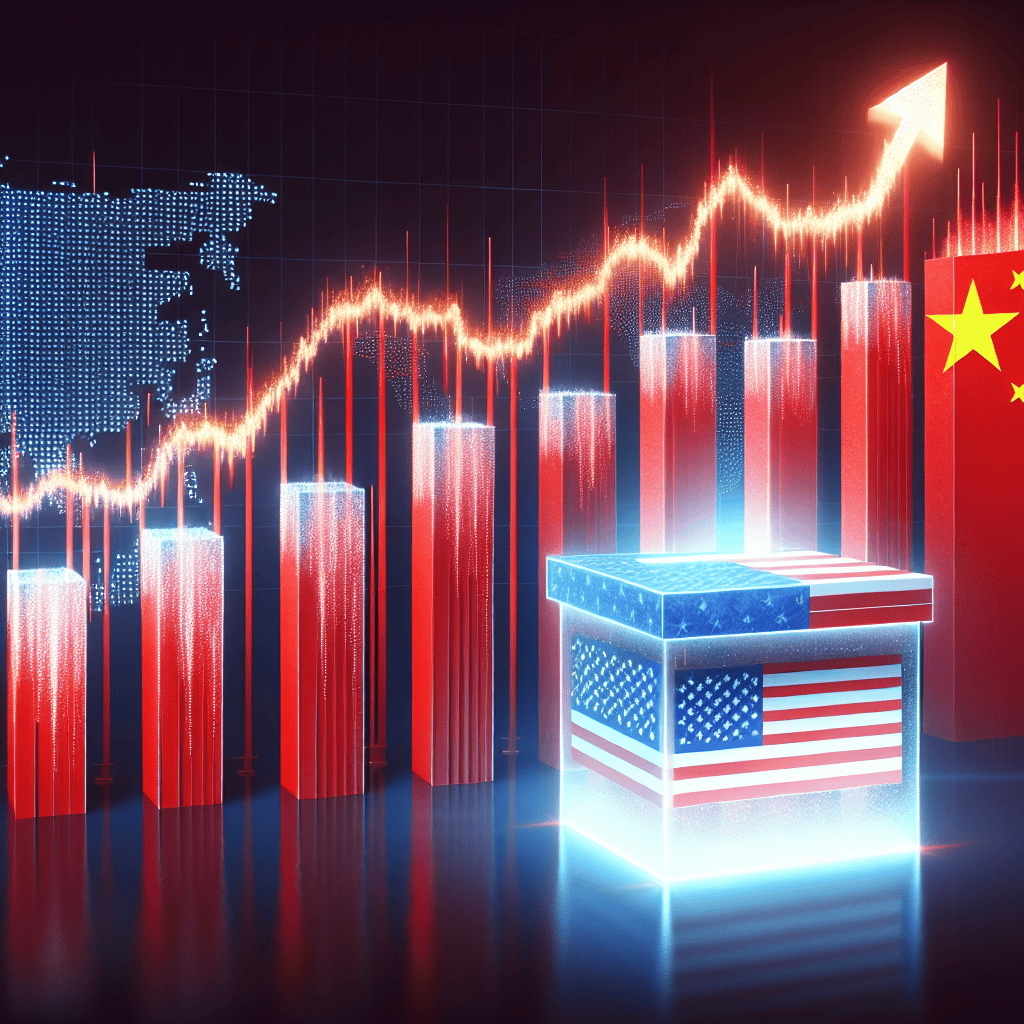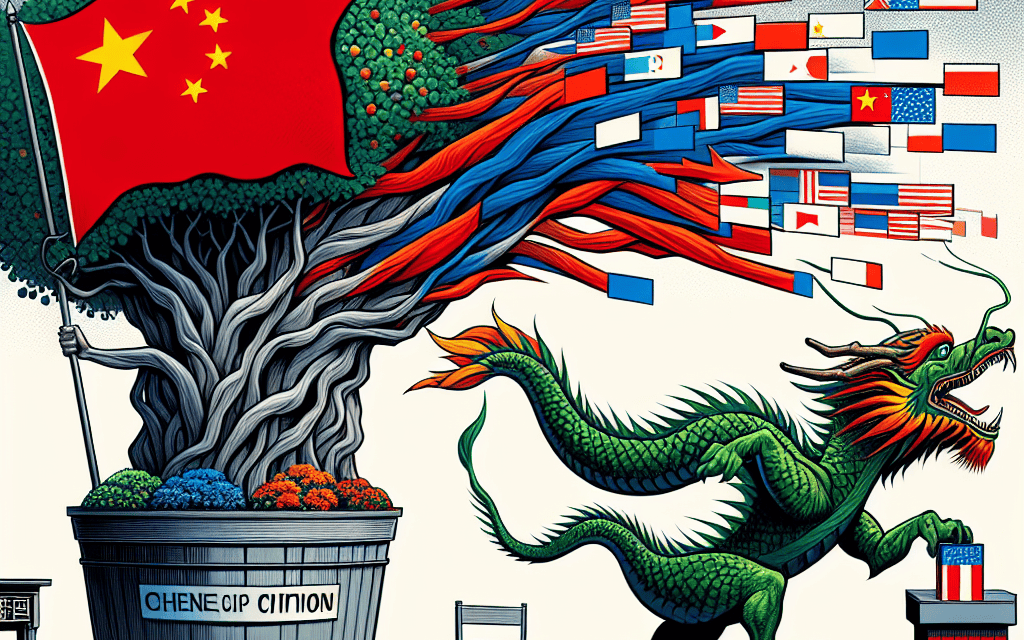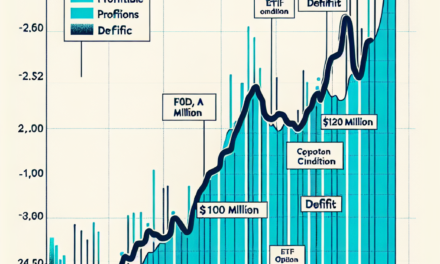“Chinese Stocks: Riding the Stimulus Wave Beyond Election Ripples”
Introduction
Chinese stocks are often more significantly influenced by domestic economic policies and stimulus measures than by external political events such as the U.S. election. This is primarily due to the centralized nature of China’s economic planning and the direct impact of government interventions on its financial markets. The Chinese government frequently employs fiscal and monetary stimulus to manage economic growth, stabilize markets, and achieve strategic objectives. These measures can include infrastructure spending, tax cuts, and adjustments to interest rates, which directly affect corporate earnings and investor sentiment within China. In contrast, while the U.S. election can have global economic implications, its direct impact on Chinese stocks is typically less pronounced compared to the immediate and tangible effects of domestic stimulus policies. As a result, investors in Chinese equities often prioritize analyzing government policy directions and stimulus announcements over international political developments.
Impact Of Chinese Government Stimulus On Stock Market Performance
In recent years, the performance of Chinese stocks has been increasingly influenced by domestic economic policies, particularly government stimulus measures, rather than external political events such as the U.S. presidential election. This trend underscores the growing importance of China’s internal economic dynamics in shaping the trajectory of its financial markets. As the world’s second-largest economy, China’s policy decisions have far-reaching implications, not only for its own stock market but also for global investors seeking to understand the forces driving market movements.
The Chinese government has frequently employed stimulus measures to bolster economic growth, especially during periods of economic uncertainty or slowdown. These measures often include fiscal policies such as increased government spending on infrastructure projects, tax cuts, and monetary policies like lowering interest rates or reducing reserve requirements for banks. Such interventions are designed to inject liquidity into the economy, encourage investment, and boost consumer spending. Consequently, these actions have a direct impact on the performance of Chinese stocks, as they create a more favorable environment for businesses to thrive and for investors to gain confidence in the market.
In contrast, while the U.S. presidential election is a significant event with potential implications for global markets, its direct impact on Chinese stocks tends to be more limited. This is primarily because the Chinese stock market is more insulated from external political events due to its unique structure and the government’s ability to exert considerable control over its financial system. Moreover, the Chinese economy is increasingly driven by domestic consumption and innovation, reducing its reliance on external factors. As a result, while U.S. elections may cause short-term volatility, they do not typically alter the long-term trajectory of Chinese stocks in the same way that domestic policies do.
Furthermore, the Chinese government’s strategic focus on transitioning from an export-driven economy to one that is more balanced and consumption-oriented has further amplified the influence of domestic stimulus measures. By prioritizing sectors such as technology, renewable energy, and consumer goods, the government aims to foster sustainable growth and reduce vulnerability to external shocks. This shift has been supported by targeted stimulus efforts, which have provided a significant boost to companies operating in these sectors, thereby enhancing their stock performance.
Additionally, the Chinese government’s ability to implement stimulus measures swiftly and decisively is a key factor in their effectiveness. Unlike in many Western economies, where political gridlock can delay policy implementation, China’s centralized decision-making process allows for rapid deployment of economic interventions. This agility enables the government to respond promptly to emerging challenges, thereby stabilizing the market and instilling confidence among investors.
In conclusion, while external events such as the U.S. presidential election can influence global market sentiment, the performance of Chinese stocks is predominantly shaped by domestic government stimulus measures. These policies not only provide immediate support to the economy but also align with China’s long-term strategic goals, ensuring that the stock market remains resilient and attractive to investors. As China continues to evolve its economic model and assert its influence on the global stage, understanding the impact of its government stimulus on stock market performance will be crucial for investors seeking to navigate this dynamic landscape.
Comparing Chinese Stimulus Measures And US Election Effects On Stocks
In recent years, the global financial landscape has been marked by a series of significant events, each with the potential to influence stock markets worldwide. Among these, the Chinese government’s stimulus measures and the United States presidential elections stand out as particularly impactful. However, when comparing the effects of these two factors on Chinese stocks, it becomes evident that domestic stimulus measures wield a more substantial influence than the outcomes of US elections. This observation underscores the growing importance of China’s internal economic policies in shaping its financial markets.
To begin with, China’s economic growth has been largely driven by government-led initiatives, which have played a crucial role in stabilizing and stimulating the economy. The Chinese government has consistently employed a range of fiscal and monetary policies to support economic growth, especially during periods of global uncertainty. For instance, during the COVID-19 pandemic, China implemented a series of stimulus measures, including tax cuts, increased infrastructure spending, and monetary easing, to mitigate the economic impact of the crisis. These measures not only helped to stabilize the Chinese economy but also provided a significant boost to Chinese stocks, as investors responded positively to the government’s proactive approach.
In contrast, while the US presidential elections are undoubtedly significant events with global ramifications, their direct impact on Chinese stocks tends to be more limited. The outcomes of these elections can influence global trade policies, international relations, and economic strategies, which in turn can affect Chinese markets. However, the effects are often indirect and subject to a range of other variables, including geopolitical tensions and domestic economic conditions. For example, the 2020 US presidential election led to expectations of a shift in trade policies, which could have affected Chinese exports. Nevertheless, the immediate impact on Chinese stocks was overshadowed by the country’s robust stimulus measures, which continued to drive market performance.
Moreover, the Chinese government’s ability to swiftly implement and adjust its economic policies provides a level of predictability and stability that is highly valued by investors. This contrasts with the uncertainty often associated with US elections, where policy changes can be contingent on a range of political factors and may take time to materialize. As a result, investors in Chinese stocks are more likely to focus on domestic policy developments rather than external political events.
Furthermore, the structure of China’s financial markets also plays a role in amplifying the impact of domestic stimulus measures. The Chinese stock market is characterized by a high proportion of retail investors, who are often more responsive to government signals and policy announcements. This dynamic can lead to more pronounced market reactions to domestic stimulus measures compared to the more diversified and institutionally driven US markets.
In conclusion, while both Chinese stimulus measures and US elections are important factors influencing global financial markets, the former has a more direct and immediate impact on Chinese stocks. The ability of the Chinese government to implement targeted economic policies, coupled with the structure of its financial markets, ensures that domestic stimulus measures remain a key driver of market performance. As China continues to play an increasingly prominent role in the global economy, understanding the nuances of its internal policy decisions will be crucial for investors seeking to navigate its financial markets effectively.
Key Sectors In China Benefiting From Government Stimulus
In recent years, the Chinese economy has demonstrated remarkable resilience and adaptability, largely due to the strategic implementation of government stimulus measures. While global markets often react to major political events such as the U.S. elections, Chinese stocks have shown a distinct pattern of being more significantly influenced by domestic economic policies. This trend is particularly evident in key sectors that have been the primary beneficiaries of government stimulus, underscoring the pivotal role of state intervention in shaping market dynamics within China.
One of the most prominent sectors benefiting from government stimulus is infrastructure. The Chinese government has consistently prioritized infrastructure development as a means to spur economic growth and create jobs. Massive investments in transportation networks, urban development, and public utilities have not only bolstered the construction industry but have also had a ripple effect on related sectors such as steel, cement, and machinery manufacturing. These investments are part of a broader strategy to enhance connectivity and support urbanization, thereby driving demand for construction materials and equipment.
In addition to infrastructure, the renewable energy sector has emerged as a key beneficiary of government stimulus. China’s commitment to reducing carbon emissions and transitioning to a more sustainable energy model has led to substantial investments in solar, wind, and hydroelectric power. Government subsidies and favorable policies have accelerated the growth of renewable energy companies, making them attractive to investors. This focus on clean energy aligns with global trends towards sustainability and positions China as a leader in the green energy revolution.
Moreover, the technology sector has also reaped significant benefits from government stimulus. Recognizing the importance of technological innovation for future economic growth, the Chinese government has implemented policies to support research and development in areas such as artificial intelligence, 5G, and semiconductor manufacturing. These initiatives have not only fostered the growth of domestic tech giants but have also encouraged foreign investment in China’s burgeoning tech landscape. As a result, the technology sector has become a cornerstone of China’s economic strategy, driving advancements that have far-reaching implications for both domestic and global markets.
Furthermore, the healthcare sector has gained momentum due to increased government spending aimed at improving public health infrastructure and services. The COVID-19 pandemic highlighted the need for robust healthcare systems, prompting the Chinese government to allocate resources towards expanding medical facilities, enhancing research capabilities, and improving access to healthcare services. This focus on healthcare has stimulated growth in pharmaceuticals, biotechnology, and medical equipment industries, attracting significant investor interest.
While the U.S. elections undoubtedly have an impact on global markets, the influence of Chinese government stimulus on domestic stocks is more pronounced. The strategic allocation of resources towards key sectors not only stabilizes the economy but also fosters long-term growth and development. By prioritizing infrastructure, renewable energy, technology, and healthcare, the Chinese government is effectively steering the economy towards a more sustainable and innovative future. This approach not only enhances China’s economic resilience but also positions it as a formidable player on the global stage, capable of weathering external political and economic uncertainties. As such, investors and analysts alike are increasingly recognizing the importance of understanding China’s domestic policies and their implications for market performance, rather than focusing solely on international political events.
Historical Analysis Of Chinese Stocks During Stimulus Periods

In examining the historical performance of Chinese stocks, it becomes evident that domestic economic stimuli have had a more pronounced impact than external political events, such as the U.S. presidential elections. This observation is rooted in the intrinsic nature of China’s economic structure and the strategic priorities of its government. Over the years, the Chinese government has frequently employed fiscal and monetary stimuli to steer its economy through various challenges, thereby exerting a significant influence on the stock market.
To understand this dynamic, it is essential to consider the context in which these stimuli are implemented. China’s economy, characterized by its rapid growth and significant state involvement, often requires intervention to maintain stability and growth. During periods of economic uncertainty or slowdown, the Chinese government has historically introduced measures such as interest rate cuts, increased infrastructure spending, and tax incentives to stimulate economic activity. These actions are designed to boost domestic consumption and investment, which in turn positively affect corporate earnings and investor sentiment, leading to a rise in stock prices.
For instance, during the global financial crisis of 2008, China launched a massive stimulus package amounting to approximately $586 billion, focusing on infrastructure projects and social welfare. This decisive action not only helped stabilize the Chinese economy but also led to a significant rally in the stock market. Similarly, in response to the economic slowdown in 2015, the Chinese government implemented a series of monetary easing measures, including interest rate cuts and reductions in reserve requirements for banks. These measures provided liquidity to the market and bolstered investor confidence, resulting in a notable recovery in stock prices.
In contrast, the impact of U.S. presidential elections on Chinese stocks has been relatively muted. While the outcome of these elections can influence global markets due to the United States’ economic and geopolitical significance, the direct effect on Chinese stocks is often limited. This is primarily because the Chinese market is more insulated from external political events, given its focus on domestic economic policies and priorities. Moreover, the Chinese government tends to prioritize stability and continuity in its economic strategy, which mitigates the potential volatility that might arise from international political developments.
Furthermore, the Chinese stock market is heavily influenced by domestic investors, who are more attuned to local economic conditions and government policies than to international political events. This investor behavior underscores the importance of domestic stimuli in shaping market trends. While international events, including U.S. elections, can create short-term fluctuations, the long-term trajectory of Chinese stocks is more closely aligned with the country’s economic policies and growth prospects.
In conclusion, the historical analysis of Chinese stocks during stimulus periods reveals a clear pattern: domestic economic stimuli have a more substantial and lasting impact on the market than external political events such as U.S. elections. This trend highlights the central role of government intervention in China’s economic model and underscores the importance of understanding domestic policy dynamics when analyzing the Chinese stock market. As China continues to navigate its economic challenges, the influence of government stimuli on stock performance is likely to remain a critical factor for investors to consider.
Investor Strategies For Navigating Chinese Stimulus-Driven Markets
In recent years, the dynamics of global financial markets have become increasingly complex, with various factors influencing investor decisions. Among these, the impact of government policies on stock markets has been particularly pronounced. In the case of Chinese stocks, it is evident that domestic economic stimulus measures exert a more significant influence than external political events, such as the U.S. presidential election. Understanding this phenomenon is crucial for investors seeking to navigate the intricacies of Chinese markets effectively.
To begin with, China’s economic landscape is heavily shaped by government intervention. The Chinese government frequently employs fiscal and monetary policies to steer the economy, especially during periods of economic uncertainty. These measures often include infrastructure spending, tax cuts, and adjustments to interest rates, all aimed at stimulating growth. Consequently, when the Chinese government announces new stimulus packages, it tends to have an immediate and profound impact on the stock market. Investors, both domestic and international, closely monitor these announcements, as they often signal potential growth opportunities within specific sectors.
In contrast, while the U.S. presidential election is a significant event with global implications, its direct impact on Chinese stocks is relatively muted. This is primarily because the Chinese market is more insulated from external political events due to its unique economic structure and regulatory environment. Although changes in U.S. policy can affect global trade dynamics and investor sentiment, the immediate effects on Chinese stocks are often overshadowed by domestic factors. For instance, even amid heightened U.S.-China trade tensions, Chinese stocks have shown resilience, largely due to the Chinese government’s proactive stimulus measures.
Moreover, the Chinese government’s ability to implement swift and decisive economic policies provides a level of predictability that is appealing to investors. Unlike the often protracted and contentious policy-making process in the U.S., China’s centralized decision-making allows for rapid response to economic challenges. This agility is particularly advantageous during times of global economic uncertainty, as it enables China to stabilize its markets and maintain investor confidence. As a result, investors are more likely to focus on the potential benefits of Chinese stimulus measures rather than external political events.
Furthermore, the sectors most affected by Chinese stimulus policies are typically those aligned with the government’s long-term strategic goals. For example, initiatives aimed at boosting technology, renewable energy, and infrastructure development are often prioritized. Investors who align their strategies with these government priorities are more likely to benefit from the positive effects of stimulus measures. This alignment not only enhances potential returns but also mitigates risks associated with external political uncertainties.
In conclusion, while global political events such as the U.S. presidential election can influence investor sentiment, the impact of Chinese government stimulus measures on the country’s stock market is more direct and substantial. For investors seeking to navigate Chinese markets, it is essential to prioritize an understanding of domestic economic policies and their implications. By focusing on sectors favored by government initiatives and remaining attuned to policy announcements, investors can better position themselves to capitalize on opportunities within China’s stimulus-driven market environment. This approach not only enhances potential returns but also provides a strategic framework for managing risks in an increasingly interconnected global economy.
The Role Of Fiscal Policy In Shaping Chinese Stock Trends
In recent years, the dynamics of global financial markets have underscored the intricate interplay between domestic policies and international events. Among these, the influence of fiscal policy on Chinese stock trends has emerged as a particularly compelling narrative. While the U.S. election often captures global headlines and is perceived as a significant market mover, it is the domestic fiscal policies within China that exert a more profound influence on its stock market. This phenomenon can be attributed to several factors, including the structure of the Chinese economy, the nature of its financial markets, and the strategic priorities of its government.
To begin with, the Chinese economy is characterized by a unique blend of state control and market-driven forces. This duality means that government policies, particularly fiscal stimulus measures, play a pivotal role in shaping economic outcomes. When the Chinese government announces fiscal stimulus packages, these are often aimed at specific sectors such as infrastructure, technology, or consumer goods. Consequently, companies within these sectors experience direct benefits, leading to a more immediate and pronounced impact on their stock prices. In contrast, the U.S. election, while significant, tends to have a more indirect and diffuse effect on Chinese stocks, primarily through its influence on global trade policies and investor sentiment.
Moreover, the Chinese stock market is heavily influenced by domestic investors, who account for a substantial portion of trading activity. These investors are typically more attuned to local economic policies and government signals than to international political events. As a result, announcements of fiscal stimulus or other economic measures by the Chinese government are closely monitored and can lead to swift market reactions. This contrasts with the impact of the U.S. election, which may be perceived as more of an external factor, with its effects filtered through the lens of global economic interdependencies.
Additionally, the strategic priorities of the Chinese government often dictate the focus and scale of fiscal interventions. In recent years, there has been a concerted effort to transition the economy towards higher value-added industries and to boost domestic consumption. Fiscal policies have been tailored to support these objectives, with significant investments in technology, green energy, and urban development. Such targeted fiscal measures not only stimulate economic growth but also enhance investor confidence in the sectors poised for expansion, thereby driving stock market trends.
Furthermore, the timing and implementation of fiscal policies in China are often aligned with broader economic goals, such as maintaining stable growth rates and ensuring social stability. This strategic approach means that fiscal stimulus is not merely a reactionary tool but a proactive mechanism to guide economic development. Consequently, the anticipation and realization of these policies can lead to sustained positive trends in the stock market, as investors align their strategies with government priorities.
In conclusion, while international events like the U.S. election undoubtedly have an impact on global markets, the influence of domestic fiscal policy on Chinese stock trends is more direct and substantial. The structure of the Chinese economy, the behavior of its investors, and the strategic objectives of its government all contribute to this dynamic. As such, understanding the nuances of Chinese fiscal policy is crucial for investors seeking to navigate the complexities of its stock market. By focusing on these domestic factors, investors can better anticipate market movements and align their portfolios with the evolving landscape of the Chinese economy.
Long-Term Implications Of Stimulus On Chinese Economic Growth
The influence of economic stimulus on Chinese stocks has become increasingly evident, overshadowing the potential impacts of external political events such as the U.S. election. As the world’s second-largest economy, China has been navigating a complex landscape of domestic challenges and international pressures. In this context, the role of government stimulus in shaping the trajectory of Chinese economic growth cannot be overstated. While the U.S. election often captures global attention, its direct impact on Chinese markets is relatively muted compared to the substantial influence of domestic fiscal and monetary policies.
To understand the long-term implications of stimulus on Chinese economic growth, it is essential to consider the nature and scope of these measures. The Chinese government has consistently employed a range of stimulus tools, including infrastructure investment, tax cuts, and monetary easing, to bolster economic activity. These interventions are designed to maintain stability and drive growth, particularly in times of global uncertainty. By injecting liquidity into the economy and encouraging consumer spending, these measures aim to sustain momentum in key sectors such as manufacturing, technology, and real estate.
Moreover, the strategic deployment of stimulus packages reflects China’s broader economic objectives. The government is keenly focused on transitioning from an export-driven model to one that is more reliant on domestic consumption and innovation. Stimulus measures, therefore, are not merely short-term fixes but are integral to this long-term vision. By fostering an environment conducive to entrepreneurship and technological advancement, China seeks to enhance its global competitiveness and reduce vulnerability to external shocks.
In contrast, the U.S. election, while significant in its own right, tends to have a more indirect effect on Chinese stocks. Political shifts in the United States can influence trade policies, tariffs, and diplomatic relations, which in turn may affect Chinese markets. However, these impacts are often mediated by the Chinese government’s proactive policy responses. For instance, in anticipation of potential trade tensions, China has diversified its trade partnerships and strengthened its domestic supply chains. Such measures mitigate the immediate effects of U.S. political changes, allowing Chinese stocks to remain more closely aligned with domestic economic policies.
Furthermore, the emphasis on stimulus highlights the Chinese government’s commitment to maintaining economic resilience. In the face of global challenges such as the COVID-19 pandemic and geopolitical tensions, China has demonstrated a capacity to adapt and respond effectively. This adaptability is crucial for sustaining long-term growth and ensuring that the economy remains robust in the face of external uncertainties.
In conclusion, while the U.S. election may capture headlines and influence global market sentiment, the long-term implications of stimulus on Chinese economic growth are far more profound. By prioritizing domestic stability and strategic development, China is positioning itself for sustained economic success. The focus on stimulus not only supports immediate recovery efforts but also lays the groundwork for future prosperity. As such, investors and analysts alike should pay close attention to the evolving landscape of Chinese economic policy, recognizing that the true drivers of growth lie within the nation’s borders rather than beyond them.
Q&A
1. **Question:** How does Chinese government stimulus impact Chinese stock markets?
– **Answer:** Chinese government stimulus can boost domestic consumption, infrastructure spending, and business investment, leading to increased corporate earnings and higher stock prices.
2. **Question:** Why might Chinese stocks be more influenced by domestic stimulus than the US election?
– **Answer:** Chinese stocks are more directly affected by domestic economic policies and government interventions, which have immediate impacts on the local economy and businesses, whereas the US election primarily affects US policies.
3. **Question:** What types of stimulus measures does the Chinese government typically implement?
– **Answer:** The Chinese government often uses fiscal measures like infrastructure spending, tax cuts, and monetary policies such as lowering interest rates and reserve requirements for banks.
4. **Question:** How do investors typically react to announcements of Chinese stimulus measures?
– **Answer:** Investors often react positively to stimulus announcements, anticipating improved economic conditions and corporate profitability, leading to increased buying activity in the stock market.
5. **Question:** Can US elections indirectly affect Chinese stocks, and if so, how?
– **Answer:** Yes, US elections can indirectly affect Chinese stocks through changes in US-China trade relations, tariffs, and global market sentiment, but these effects are generally secondary to direct domestic policies.
6. **Question:** What sectors in China are most likely to benefit from government stimulus?
– **Answer:** Sectors such as infrastructure, construction, technology, and consumer goods often benefit the most from government stimulus due to increased spending and investment.
7. **Question:** How does the timing of stimulus measures affect their impact on Chinese stocks?
– **Answer:** The timing of stimulus measures is crucial; timely interventions can stabilize markets and boost investor confidence, while delayed measures may lead to prolonged economic uncertainty and market volatility.
Conclusion
Chinese stocks are more significantly influenced by domestic stimulus measures than by the outcomes of the U.S. election. This is primarily because China’s economic policies and growth prospects are heavily driven by internal government actions, such as fiscal stimulus and monetary easing, which directly impact domestic consumption, infrastructure investment, and overall economic stability. While the U.S. election can affect global markets and trade relations, the immediate and tangible effects of Chinese government interventions tend to have a more direct and pronounced impact on the performance of Chinese stocks. Consequently, investors in Chinese equities are more likely to respond to changes in domestic policy than to external political events like the U.S. election.





